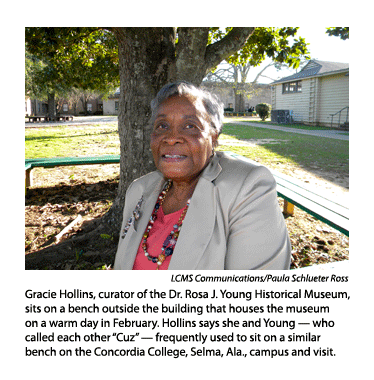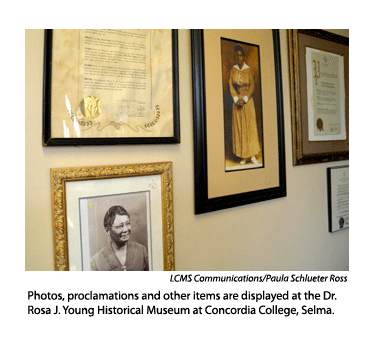Tucked away in a former classroom on the campus of Concordia College, Selma, Ala., is a one-room testimony to Dr. Rosa J. Young — the LCMS teacher, missionary, lecturer and fundraiser who traveled the South in the early to mid-190 0s, starting Lutheran schools and congregations.
0s, starting Lutheran schools and congregations.
Young, known as the “mother of black Lutheranism in central Alabama,” died in 1971 at the age of 81.
The Dr. Rosa J. Young Historical Museum is located in a classroom where Young actually taught religion as a faculty member at the college.
If you visit on a Tuesday or Thursday, you will likely be greeted by Gracie Hollins, 74, who took over as the museum’s part-time, volunteer curator in 2010. Hollins, who has held various positions at Concordia College for — as of February — “41 years and five months,” knew Young when the famed educator was in her 70s and living in an apartment in Rosa Young Hall on the Selma campus.
Hollins, who was then in her early 20s and just starting her career, recalled how she and Young called each other “Cuz” (short for “cousin”) — Young was a distant relative to Hollins’ mother-in-law — and often sat together outside on a bench, talking.
often sat together outside on a bench, talking.
Hollins says she loved Young. “She was genuine, she spoke what she believed — [she was] very, very religious” and a strict disciplinarian, she said.
“She [wanted] to make a preacher out of every single young man who came through the door. [She was a] very tiny lady, but very, very strong — very strong in her beliefs, very strong in her ideas.”
The museum includes photos of Young; proclamations and letters; and an original copy of her 1930 autobiography, Light in the Dark Belt. Hollins laments that a lot of memorabilia was lost in a fire at Young’s sister’s home in Wilcox County, Ala., that also took the life of her sister.
Young never married, and Hollins says the famed educator “was so devoted to her work that I never even heard of anyone saying that Dr. Young even dated anyone.”
Said Hollins: “The school, the church and the students — that was her life.”
Posted March 7, 2012



